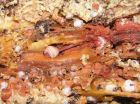(Press-News.org) First pregnancies complicated by postpartum haemorrhage (PPH) have no detrimental effect on future fertility but women who have caesarean sections at the time of PPH are less likely to conceive again, finds a new study published today (23 January) in BJOG: An International Journal of Obstetrics and Gynaecology.
There has been a rise in the overall rate of PPH (where blood loss is >500ml) in the UK, due to increases in maternal risk factors and in the number of caesarean sections performed. Women who undergo caesarean section deliveries are more likely to suffer PPH than vaginal deliveries (59% vs 21%).
This study, conducted at the Aberdeen Maternity Hospital in Scotland over a 20-year period (1986-2005), using information from the Aberdeen Maternity and Neonatal Databank looked at 34,334 first pregnancies and found that 10% experienced PPH.
The paper identified increased maternal age, high BMI readings and smoking as contributing risk factors to the likelihood of experiencing PPH.
After their first pregnancy, the women were monitored for a minimum of five years to identify a second pregnancy. Women who had experienced PPH in their first pregnancy were then compared to women who did not.
Researchers found that there were no significant differences between those who experienced PPH and those who did not for the proportion of women who went on to conceive a second pregnancy, in the time interval between pregnancies or in early/late pregnancy loss.
However, mode of delivery among women who had initially experienced PPH was a significant factor in the likelihood of a second pregnancy. Of the women who initially had a caesarean section that was complicated by PPH, 41.5% did not conceive a second pregnancy compared to 36.8% of women who had a caesarean section that was not complicated by PPH.
The paper also found that women who were initially exposed to PPH showed a high recurrence rate and were 2.9 times more likely to experience PPH during their second pregnancy than those who had no initial exposure (18% vs 6.9%).
Gail Fullerton from the Aberdeen Maternity Hospital, and co-author of the study, said:
"While experiencing PPH in an initial pregnancy increases the risk of recurrence in subsequent pregnancies, it should not be cause for concern in relation to future fertility.
"The women in our study showed no adverse affects to the likelihood or timing of future pregnancies after an initial PPH complication.
"However, it is clear that more research needs to be done to ascertain why there is a significant decrease in a subsequent pregnancy following PPH at time of an initial c-section delivery."
John Thorp, BJOG Deputy-Editor-in-Chief, added: "While PPH remains a major cause of maternal morbidity and mortality around the world, there have been improved changes to obstetric practice in the UK over the past decade in relation to management and treatment, leading to a reduction in the rates of adverse outcomes such as hysterectomy.
"PPH is a very traumatic experience for women and this study is reassuring in its findings that there is no overall reduction in the numbers returning for a second pregnancy following an initial PPH complication.
"Any women who harbour concerns after experiencing PPH should consult their obstetrician about the mode of delivery and management of any subsequent pregnancies."
### END
Postpartum hemorrhage during a first pregnancy does not affect future fertility
2013-01-23
ELSE PRESS RELEASES FROM THIS DATE:
Business, government can span tech divide for people with disabilities
2013-01-23
UNIVERSITY PARK, Pa. -- Forging public and private partnerships that encourage broadband access for people with disabilities may help bridge a technological divide that hinders them from reaching their potential, according to an international team of researchers.
Besides connecting people who have disabilities with resources that may help them become more independent, equipping them with broadband technology can also benefit society and ease the financial burden on taxpayers, said Krishna Jayakar, associate professor of communications, Penn State.
"The benefits of bridging ...
When will we all live to 100?
2013-01-23
Databriefing: How long can we expect to live?
An article from John Appleby, Chief Economist at the Kings Fund, published on bmj.com today brings attention to the rising amount of those expected to live to 100 and asks where it will end.
According to the Office of National Statistics there seems to be "no end in sight" as far as the number of UK citizens reaching 100 years old is concerned. Approximately 13% of girls born in 1951 are expected to reach this milestone, increasing to 40% for girls born this year and a predicted 60% of those born in 2060.
Appleby attributes ...
Researchers map emotional intelligence in the brain
2013-01-23
CHAMPAIGN, Ill. — A new study of 152 Vietnam veterans with combat-related brain injuries offers the first detailed map of the brain regions that contribute to emotional intelligence – the ability to process emotional information and navigate the social world.
The study found significant overlap between general intelligence and emotional intelligence, both in terms of behavior and in the brain. Higher scores on general intelligence tests corresponded significantly with higher performance on measures of emotional intelligence, and many of the same brain regions were found ...
Wood on the seafloor -- an oasis for deep-sea life
2013-01-23
This press release is available in German.Trees do not grow in the deep sea, nevertheless sunken pieces of wood can develop into oases for deep-sea life - at least temporarily until the wood is fully degraded. A team of Max Planck researchers from Germany now showed how sunken wood can develop into attractive habitats for a variety of microorganisms and invertebrates. By using underwater robot technology, they confirmed their hypothesis that animals from hot and cold seeps would be attracted to the wood due to the activity of bacteria, which produce hydrogen sulfide during ...
Vitamin D holds promise in battling a deadly breast cancer, Saint Louis University researchers say
2013-01-23
ST. LOUIS -- In research published in the Jan. 21 issue of The Journal of Cell Biology, a team led by Susana Gonzalo, Ph.D., assistant professor of biochemistry and molecular biology at Saint Louis University, has discovered a molecular pathway that contributes to triple-negative breast cancer, an often deadly and treatment resistant form of cancer that tends to strike younger women. In addition, Gonzalo and her team identified vitamin D and some protease inhibitors as possible new therapies and discovered a set of three biomarkers that can help to identify patients who ...
In the land of the free, interdependence undermines Americans' motivation to act
2013-01-23
Public campaigns that call upon people to think and act interdependently may undermine motivation for many Americans, according to new research published in Psychological Science, a journal of the Association for Psychological Science.
Americans are repeatedly exposed to messages urging them to think and act with others in mind, telling us, for example, to act sustainably by bringing reusable bags to the grocery store or to act responsibly by getting a flu shot. Researchers MarYam Hamedani, Hazel Rose Markus, and Alyssa Fu of Stanford University wondered what impact these ...
First global assessment of land and water 'grabbing' published in national journal
2013-01-23
As world food and energy demands grow, nations and some corporations increasingly are looking to acquire quality agricultural land for food production. Some nations are gaining land by buying up property – and accompanying water resources – in other, generally less wealthy countries.
Sometimes called "land grabbing," this practice can put strains on land and water resources in impoverished countries where the land, and needed water, has been "grabbed" for commercial-scale agriculture.
A new study by the University of Virginia and the Polytechnic University of Milan, ...
USDA studies confirm plant water demands shift with water availability
2013-01-23
WASHINGTON, January 22, 2012—Plants can adapt to extreme shifts in water availability, such as drought and flooding, but their ability to withstand these extreme patterns will be tested by future climate change, according to a study by U.S. Department of Agriculture (USDA) scientists and their cooperators.
The study was published this week in Nature by a team of Agricultural Research Service (ARS) scientists led by Guillermo Ponce Campos and Susan Moran and an Australian team led by Alfredo Huete from the University of Technology, Sydney (UTS). This research included ...
Just add water: How scientists are using silicon to produce hydrogen on demand
2013-01-23
BUFFALO, N.Y. — Super-small particles of silicon react with water to produce hydrogen almost instantaneously, according to University at Buffalo researchers.
In a series of experiments, the scientists created spherical silicon particles about 10 nanometers in diameter. When combined with water, these particles reacted to form silicic acid (a nontoxic byproduct) and hydrogen — a potential source of energy for fuel cells.
The reaction didn't require any light, heat or electricity, and also created hydrogen about 150 times faster than similar reactions using silicon particles ...
People seek high-calorie foods in tough times
2013-01-23
Bad news about the economy could cause you to pack on the pounds, according to a new study published in Psychological Science, a journal of the Association for Psychological Science.
The study shows that when there is a perception of tough times, people tend to seek higher-calorie foods that will keep them satisfied longer. When subconsciously primed with such messages, a "live for today" impulse is triggered causing people to consume nearly 40 percent more food than when compared to a control group primed with neutral words.
"The findings of this study come at a time ...

